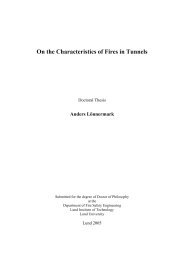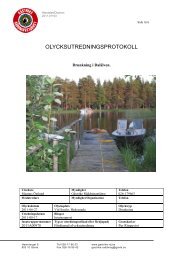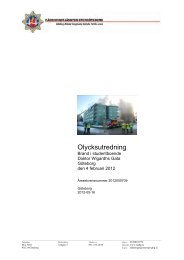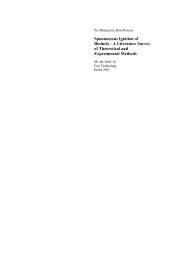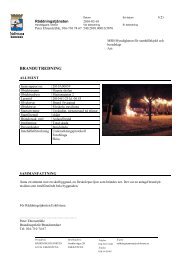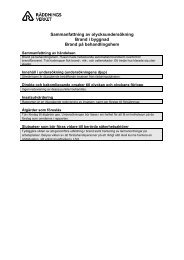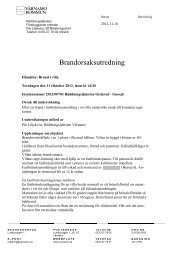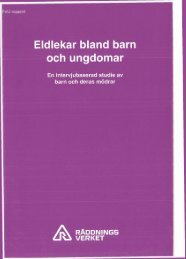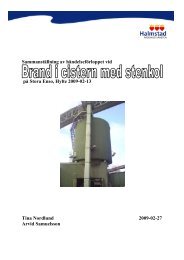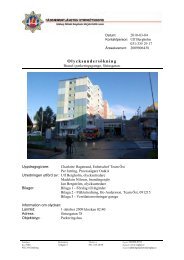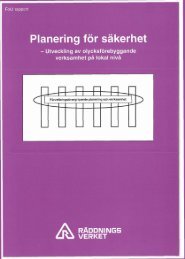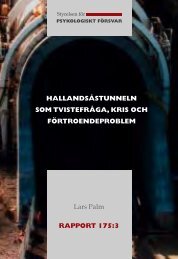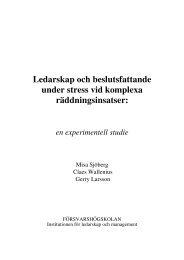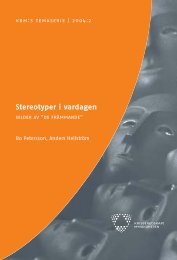Sverige
Sverige
Sverige
You also want an ePaper? Increase the reach of your titles
YUMPU automatically turns print PDFs into web optimized ePapers that Google loves.
kris och lärdom 15<br />
disasters for centuries and lacks the long disaster-response<br />
history of the UK for example and its response<br />
to the bombing of Britain during the Second World<br />
War. But in Sweden and in local Swedish communities,<br />
there is also a culture of being able to mobilise<br />
for various reasons, and this has strengthened the capacity<br />
to establish an effective response.<br />
Experience and lessons learned<br />
Experience is a major contributor to effective disaster<br />
response and crisis communications. A general<br />
view held by the interviewed disaster professionals in<br />
this study is that they and their agencies have gained<br />
valuable knowledge from the outcomes of previous<br />
disasters and that this has influenced both the forms<br />
of response and the capacity to respond to different<br />
disasters.<br />
Three types of learning have been identified by<br />
Boin, ’t Hart, Stern & Sundelius – experience, explanation<br />
and skill-based learning. The first type of learning<br />
refers to one’s previous experiences. The second<br />
type is a critical scientific evaluation by “crisis auditors”.<br />
The third type refers to using existing skills as<br />
a basis for creating new crisis management techniques<br />
(Boin, ’t Hart, Stern & Sundelius 2005:117f). The response<br />
to old and new crises in this study is primarily<br />
based on the principle of experience-based learning<br />
in combination with skill-based learning. The second<br />
type with special crisis auditors is rarely employed by<br />
local authorities in Sweden.<br />
Based on the cases studied, lessons are learned from<br />
disaster response in two main ways: through exercises<br />
and by working with disaster issues from previous extreme<br />
events. Knowledge is also gained by studying<br />
evaluations and research into other events, through<br />
field trips and by taking part in disaster management<br />
courses, etc.<br />
Exercises are an important feature of disaster management<br />
according to the interviewed disaster professionals<br />
in this study. But there is no doubt that<br />
personal experience in previous response operations<br />
provides the most effective training. In other words,<br />
learning by doing creates the best conditions for commanding<br />
and responding to disasters.<br />
In what way has experience been significant and<br />
what are the lessons learnt Gathered historical knowledge<br />
can lead to a more effective response in the various<br />
phases of the management process. Testing response<br />
alternatives is easier and decisions are made<br />
more effectively. Experience plays a particularly significant<br />
role in the initial phase of the response. Disaster<br />
professionals with a disaster response history can<br />
launch a response faster and easier than disaster professionals<br />
without this experience. They know what<br />
strings to pull – how to structure the operation, what<br />
contacts to initiate, what practical problems can arise,<br />
how these can be manoeuvred and what effects can<br />
be expected from different decisions, etc. Communication<br />
units know how different media/channels function<br />
in disasters, what contact is needed with different<br />
groups and what problems can arise in the distribution<br />
process. Not surprisingly, experience of previous<br />
disasters appears more important for administrative<br />
officials than for those who normally handle different<br />
types of incidents such as rescue operation managers<br />
and medical professionals. Experience also appears to<br />
be more significant in an extended organisation than<br />
in an established organisation with regular tasks (Cp.<br />
Dynes 1970).<br />
In the communication area, experience has been incorporated<br />
into established forms for media contact,<br />
switchboard and information services, relations with<br />
affected households and individuals and handling<br />
inter-organizational contacts effectively in the acute<br />
phase. This also includes realizing the benefits of overall<br />
and coherent communication in terms of physical/



